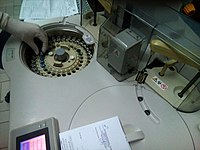
Photo from wikipedia
BACKGROUND Vitamin D is a lipid-soluble molecule that plays key physiological roles in the metabolism of calcium, phosphate and magnesium. Recent studies show that deficiency in vitamin D is linked… Click to show full abstract
BACKGROUND Vitamin D is a lipid-soluble molecule that plays key physiological roles in the metabolism of calcium, phosphate and magnesium. Recent studies show that deficiency in vitamin D is linked to cardiovascular diseases, autoimmune diseases and cancer. As a result, regular monitoring of 25-OH vitamin D (the main circulating form of vitamin D) is becoming essential. Current 25-OH vitamin D testing methodologies are cumbersome (too many reagents, long incubation times, phase separation) and are not compatible with general clinical chemistry platforms. Here, we report on a novel method to detect 25-OH vitamin D that is fast (results in 10 min or less), simple (two reagents) and compatible with virtually all general clinical chemistry analyzers. METHODS An immunoturbidimetric assay for 25-OH vitamin D (the Diazyme EZ Vitamin D Assay) has been developed using nanoparticles and vitamin D-specific antibodies. The performance of the assay kit, which consists of two reagents and five calibrators, was tested on the Beckman AU680 analyzer (AU680). RESULTS The new assay was precise, sensitive (LOD = 7.2 nmol/L), linear (up to 390.1 nmol/L) and correlated strongly (R2 > 0.95) with major commercial 25-OH vitamin D assays. Additionally, the assay was found to be the fastest to date, with the first results obtained within 10 min. Throughput on the AU680 was estimated at over 300 tests per hour. CONCLUSIONS The newly developed 25-OH vitamin D assay is fast, precise and accurate. It can be run on most general chemistry analyzers. This assay aims at providing vitamin D-testing capabilities to all clinical chemistry laboratories.
Journal Title: Clinical biochemistry
Year Published: 2018
Link to full text (if available)
Share on Social Media: Sign Up to like & get
recommendations!